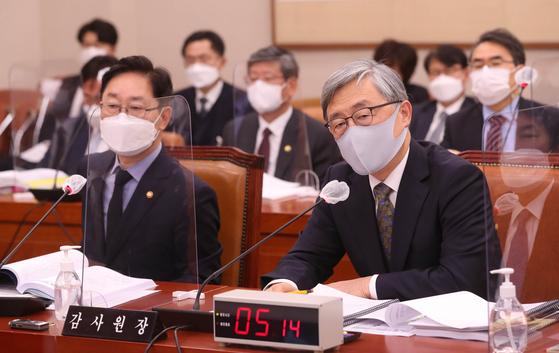
Auditor Choi Jae-hyung attends the general meeting of the Legislative Judicial Council held at the National Assembly in Yeouido, Seoul on the morning of the 22nd to answer questions from lawmakers. News 1
Auditor General Choi Jae-hyung said in a report on the National Assembly’s Legislative Judicial Committee on the 22nd, “It is difficult to agree with the expression that the standard of law should not be put on the administrative actions of public officials.” Park Seong-joon, a Democratic Party lawmaker, responded when he pointed out, “If we investigate policies and put the standards of law, there will be no space for public officials to work.”
Director Choi said, “The administrative actions of public officials must be made transparent in accordance with the procedures prescribed by the law.” “(Rep. Park’s) expression doesn’t seem to mean that (it doesn’t have to be transparent), so I’ll go over that.” did. He said, “It’s right to do the president’s pledge and policy implementation properly,” he said. “But, isn’t it a claim that the policy can be carried out regardless of any means and methods?”
“(Audit) does not judge policy. It is to see the legitimacy of the policy implementation process. What we were grateful for was never seeing the purpose of the policy implementation, the implementation itself.”

Auditor Choi Jae-hyung is locked in thought at the plenary meeting of the Legislative Judicial Council held at the National Assembly in Yeouido, Seoul on the morning of the 22nd. News 1
“The policy is not subject to audit” is the logic that the Democratic Party has attacked the Audit Committee since the announcement of the audit of Wolsong Unit 1 in October last year. Democratic Party lawmaker Yoon Gun-young wrote on Facebook last November that “the closure of Wolseong Unit 1 was a policy that was supported by the people through elections as a presidential election pledge,” and “to audit or investigate the closure policy itself is a head-on challenge to democracy.” However, the audit of Wolseong Unit 1 only dealt with the procedural legitimacy of the economic feasibility assessment process that was the basis for the early closure.
When the Board of Audit and Inspection launched an audit last month to see if the Moon Jae-in government’s process of establishing a nuclear power plant policy was procedurally valid, the ruling party again pressed the same logic. On the 15th, the day after the news of the start of the audit was announced, Choi In-ho, chief spokesman of the Democratic Party, criticized that “the auditor expressed his gratitude for the government’s energy conversion policy. However, the auditor emphasized that this audit only deals with procedural issues in the policy-making process.
At the meeting of the Judiciary Committee on that day, there was a question of Democratic Party lawmaker So Byung-cheol whether all the audit committee members agreed to send investigation reference materials to the prosecution after Wolseong Unit 1 audit. Director Choi said, “(Sending the investigation reference material) is not a matter of the resolution of the Audit Committee. Most of the (Audit Committee) agreed that a crime can be established depending on whether or not the investigation is conducted. “ He added, “No one objected to sending the investigation reference material (to the prosecution).” Director Choi said, “I have no objection to reading the minutes of the (Audit Committee) meeting.”
Reporter Yoon Seongmin [email protected]
